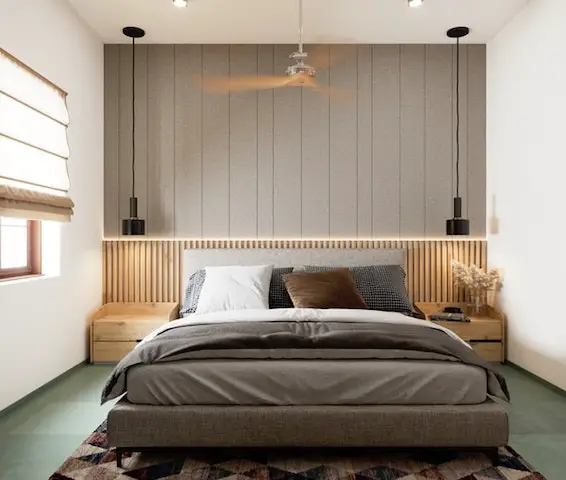In the middle of the summer, the last thing you want is to have a hot room so uncomfortable that you can’t sleep. Perhaps your internal body temperature is naturally warmer than normal, and the fan is your best friend, even at night to help you fall asleep. Regardless of the case, you may have heard that there are both pros and cons to sleeping with a fan on.
It is incredibly important to get a sufficient amount of sleep every night. The quality of sleep also has great importance. Having a good night’s sleep allows us to wake up refreshed. We are more productive, energetic, and ready to take on the day and everything it entails.
Does a Fan Help You Sleep?
To begin, a fan will control the temperature of the room and will stimulate the body into dropping its body temperature. Fans are great at circulating the air within the room so that it doesn’t get too hot and stuffy. Though they aren’t as great as air conditioning systems, the soft breeze from the fan will cool you off so that you can get comfortable enough to sleep. We’ve all experienced a long restless night where we couldn’t get any sleep due to all the sweating. Additionally, using a fan while the air conditioning is throwing out cold air will help freshen up the entire room rather than just circulating the air that is currently in the room.
Fans produce a sound similar to white noise. White noise is a combination of all frequencies playing at once. Since there are a large number of frequencies playing at the same time, it is difficult for your brain to pick and focus on just one frequency. White noise then turns into a comforting background noise because your mind doesn’t focus on just one frequency. If you live in an apartment complex or have noisy neighbors, the noise from a fan will help mask any outer noise. Without all the noise from traffic, neighbors, and any other irritating noises, you will be able to relax, quiet your mind and get a good night’s sleep.
In comparison to any type of air conditioning system, a fan will save you more money. You can find plug-in fans at a reasonable price, and the overall cost of having an air conditioning system is far more expensive. To get air conditioning in your living space, you must buy the system itself and make accommodations to make sure that it is suitable for your living space. if you live in an area where it doesn’t get too hot, a fan will meet your needs to provide a well-vented room.
As mentioned before, a fan will circulate the air in the room and prevent it from getting stuffy. The airflow makes the room comfortable and can help you feel less claustrophobic. When a room is stuffy, at times it feels as if the air is sitting right on top of you and almost trapping you. Furthermore, it will also prevent the risk of SIDS, sudden infant death syndrome, and unexplained death in babies while they are asleep. Though the cause isn’t known, not getting enough air, as well as being too warm, can put a baby at risk of SIDS. Thankfully, a fan is great for both of those risks and can possibly save the life of a baby.
Risks of Sleeping with a Fan On
There truly isn’t any serious risk when sleeping with the fan on during the night. However, some may experience some irritation. Though the sound of the fan can create a relaxing white noise, light sleepers may disagree. Fans aren’t incredibly loud, especially modern fans, but people who are light sleepers can get disturbed by even the smallest of noises. In all honesty, being too hot and sweaty at night is more disruptive than the sound of a fan. This is a minor issue that can be solved by simply buying a modern fan that produces the least amount of noise.
If you sleep with a fan on, you are sure to get dry mouth, nose, and throat due to the circulating air. You won’t get sick from the fan, but it can cause a stuffy nose, sore throat, and even headaches. Additionally, if you are already sick, it may worsen your symptoms and lengthen the time of sickness.
The air circulating the room can also dry out the eyes and skin. This could then lead to itchy and red eyes, as well as dry, flaky irritated skin. These can both be easily fixed with soothing eye drops and applying lotion to the skin, but it is still uncomfortable having to wake up in these situations. The dry eyes and skin can also develop into an even bigger issue that may take more than eye drops and lotion to fix.
With all the air circulating in the room, fans can also circulate dust, pollen, dust mites, and other substances that are in the air. The fan itself can carry a lot of dust and dirt. This can be a huge danger to people who already suffer from asthma and allergies. Asthma attacks are dangerous and can lead to shortness of breath, coughing, wheezing, and can cause death in severe situations. As for people with allergies, the dust and pollen can turn on your symptoms of a runny nose, watery eyes, itchy throat, sneezing, and even difficulty in breathing.
Can Sleeping Under a Fan Cause Body Aches?
Possibly one of the most common negative side effects that you hear about from sleeping with a fan on is the disturbance in the muscles. Perhaps you have been out in the cold and you feel your legs and back beginning to hurt and cramp up. It is quite similar to sleeping with a fan on. The air of the fan will cause your muscles to contract and tense up due to the drop in temperature. It is common to feel these muscle aches in your legs and in the neck, but it is not ideal to wake up with these conditions. If you have work in the morning, there isn’t much time for you to get rid of the muscle aches with ice packs or a hot bath.
Regardless of the cons, there are some precautions to be aware of when sleeping with a fan on. Be sure to place the fan a few feet away from you to avoid direct contact with the air. Turn on the oscillation feature of the fan, if it has one so that the fan isn’t directly blowing onto you for the entire night. If your fan is on the ceiling, the best thing to do is to sleep with warm clothes and cover up with a blanket or two.
To avoid allergies and potential asthma attacks, be sure to clean the fan regularly to remove any unwanted dust and pollen. Don’t forget to clean the room as well since it is quite easy for dust to collect.
Applying a moisturizing lotion to your skin will go a long way to prevent dry, flaky, and itchy skin.
Alternative Options to Sleeping with a fan on
Perhaps you have realized that a fan isn’t the best option for you. Luckily, there are other ways to go about it so that you don’t suffer through the night. Instead of bundling up with warm clothes and multiple blankets, wear loose-fitting clothes. Fabrics like silk, linen, and cotton will keep you cool. If that isn’t enough, you can grab a cold facecloth and place it on your head to keep you cool through the night.
There are mattresses that have technologies to keep you cool throughout the night. Pair a cool mattress with bed sheets that don’t trap in heat and you will have a great night’s sleep without having to worry about being uncomfortable from the heat and sweat.
Sleeping with a fan is one of those situations where you just have to pick what is best for you. There are equal cons and pros to sleeping with a fan on. When deciding, take into consideration the benefits in comparison to the negative side effects and pick the option that is best for your lifestyle.
References
Booth, Jessica. August 16, 2018. 6 Surprising Health Benefits Of Sleeping With A Fan On
https://www.bustle.com/p/6-benefits-of-sleeping-with-a-fan-on-other-than-not-sweating-10128486
HowStuffWorks. What Is White Noise?
https://science.howstuffworks.com/what-is-white-noise.htm
Marks, Julie. November 13, 2020. Is it Healthy to Sleep with a Fan On?
https://www.healthline.com/health/sleeping-with-fan-on
Mayo Clinic. Sudden infant death syndrome (SIDS)
Rettner, Rachael. July 27, 2018. Is Sleeping with a Fan On Actually Bad for Your Health?
https://www.livescience.com/63179-sleeping-fan-health.html
Seladi-Schulman, Jill. Ph.D. March 20, 2019. Asthma Attack Death: Know Your Risk
https://www.healthline.com/health/asthma/asthma-attack-death
Sleep Junkies. January 26, 2018. Does Sleeping with a Fan Cause Back or Neck Pain?
West, Dawn. September 27, 2021. Sleeping With a Fan on – Pros and Cons
Sleeping With a Fan on – Pros and Cons


